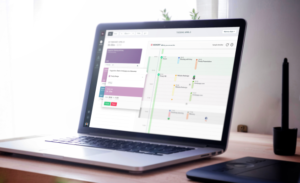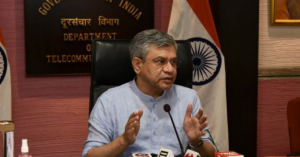With over 20 blockchain-based solutions, TCS Quartz has clients from across the globe, including Switzerland, Singapore, India and other countries
While there is a deep understanding of blockchain potential in India, the backbone in terms of countrywide infrastructure is currently missing, says TCS’ BFSI Head R Vivekanand
“In countries where crypto is legally permissible we do provide crypto-based solutions,” Vivekanand said
Startups have become such a craze in India that big legacy companies like Reliance, Tata and Mahindra are now running certain projects/subsidiaries as startups when it comes to foraying into tech-based products and services. Reliance Group chairman Mukesh Ambani once called Jio as the world’s largest startup with an investment of over INR 1.5 Lakh Cr.
Similarly, for the past few years, Tata Group’s TCS has been running Quartz blockchain as a startup. A horizontal platform, Quartz has been used by some of the biggest banks across the globe for various applications.
Ranked among the top five providers in the HFS Top 10 for Enterprise Blockchain Services, Quartz offers foundational technology, tools, and business components for creating distributed ledger solutions across varied industries.
The reason behind running the platform as a startup is that in the blockchain industry, the company is competing mostly with startups rather than the traditional IT companies, says R Vivekanand, global head of BFSI Products and Platforms at Tata Consultancy Services (TCS). Vivekanand is also additionally responsible for the incubation of Quartz, TCS’ platform for leveraging distributed ledger technology.
In an interview with Inc42, Vivekanand talked about Quartz, the potential of blockchain technology, talent in India and more. Here are edited excerpts from the interview:
Inc42: First of all, tell us what Is Quartz?
R Vivekanand: We have been incubating Quartz as a blockchain startup for the last four to five years and have been very active in the go-to-market for the last couple of years.
Blockchain, as a technology, has tremendous power even in the intersection between two industries. So in that sense, while there is a very strong BFSI acceptance of blockchain, there is a significant uptake in other industries, including supply chain, manufacturing, logistics, government, etc. So, in that sense, Quartz is a horizontal solution that leverages blockchain and is positioned across business verticals.
Quartz has got multiple parts. First, from a solution perspective, the philosophy that we have in our design is that our solutions will coexist with existing systems. We are not starting off with the philosophy that we will go there and replace core systems or replace all the systems. That’s impractical. So, we deliver fit-for-purpose solutions that coexist with the core solutions.
Second, it needs to integrate and the data needs to interoperate with all the existing systems.
Those are design considerations that underpin what we do as Quartz. Then, when it comes to the solution, we have got what we call the dev kit, with which developers can develop and deliver solutions that our customers want.
We’ve got a gateway with which you can integrate, along with existing systems, blockchain-based systems or otherwise message-based systems. And then we’ve got a number of smart solutions. We call them Quartz Smart Solutions because the underlying philosophy for those solutions is smart contracts. They run by themselves.
We are doubling our customer base every year. This primary customer base as of now is BFSI. But that’s not the only positioning for Quartz.
Inc42: Did you also develop any in-house blockchain to ‘fit for all’ solutions?
R Vivekanand: We don’t want to develop our own underlying blockchain technology. See, we see this technology as foundational in nature. So when I say that our technology is foundational, this means blockchain is foundational. You can compare it to, let’s say, 5G or 4G or TCP/IP (Transmission Control Protocol/Internet Protocol) or any other kind of network technology. So, it does not matter if the underlying technology is Hyperledger or Ethereum or Corda from R3, our approach is to develop smart solutions on top of that.
We are thus technology agnostic when it comes to the underlying foundational technology whether it’s Hyperledger, Ethereum, Corda, Tezos or other blockchains.
We don’t want to lock ourselves around one blockchain. In fact, the big differentiator of Quartz is that we support multiple blockchain technologies.
Inc42: Tell us about some of the blockchain solutions that you have developed so far.
R Vivekanand: Our focus is B2B and the nature of blockchain is also B2B in its initial stages because it tends to take out intermediaries and inefficiencies in the non-digital value chain between two businesses.
We’re doing one programme in Israel where we are digitising more than 60% of the bank guarantees in the country. That will go on our blockchain platform. It’s a complete end-to-end solution that runs on top of Quartz.
Similarly, for one of India’s largest private sector banks, we have done lending between their branches which otherwise was not electronic till we put it on Quartz. We are now working with them and are hoping that at the next stage they will extend it beyond their banks. Today, it is restricted between their bank branches which could be Indian and overseas branches. However, such transactions also occur between different banks.
We have also done one programme in Singapore where we are creating non-duplicable proof in terms of environment certificates for green energy or solar energy. So, at the point of generation of solar energy, it is the number of units that is calculated and it then directly goes and creates environment certificates on a blockchain.
We currently have about 20 smart solutions and we continue to create them in response to the market. The solutions that we have announced, and we are very aggressive in our go-to-market, are related to the capital markets and the digital asset space.
So we have a set of solutions called Quartz for markets because the whole digital asset trading, custody, and settlement space is moving very fast. So, in that space, globally, we want to have a set of solutions that are fit for purpose so that people can create and trade and settle digital assets.
Such digital assets could be real estate in some countries, they could be housing societies, art, NFTs etc. So, our definition of digital assets cuts across the spectrum.
Inc42: Where does India stand in terms of blockchain infrastructure and talent pool? How do you meet the gap?
R Vivekanand: There is a deep understanding of the potential of blockchain at the national level and what it can do and offer. This is why we have been able to run serious projects. There is an understanding of the power of technology. There are state and central governments which are also creating blockchain-only ideas, and those will have to come to scale. They have done enough pilot projects in this regard.
However, for India, we need solutions at a scale that can not be imagined elsewhere. We need to have a nationwide backbone for these solutions. I think it will happen, but we do not have the backbone yet.
It will fall in place because clearly the understanding and the intent are there.
Now, if you look at it from a talent perspective, this is very tricky because this is a very niche and highly skilled area. I would put it one notch above in terms of complexity and the skill level needed. It’s not volume skills.
To meet the talent gap, we’ve created a toolset in which you can programme like you would do for Java. This means every college student, every developer who does mainstream Java programming, if they use Quartz, they can create solutions that leverage the underlying blockchain technology.
The reason we have done that is that we believe we have created something unique with which we can simplify the skill and complexity. We don’t need to train every individual to understand Ethereum, Hyperledger, some new technology that comes up even within them…one version to another, there are big changes.
We want to abstract that in a small group of blockchain programmers who are very good at that and are basically researching this. They then simplify it for a number of other programmers who can write very good Java code. That in turn gets translated into blockchain on block near blockchain native code. That’s the approach we have taken to integration also with Quartz Gateway.
So our idea with these tool sets, and these are not just for use by TCS, these are available to our customers, our partners. We provide them on a per seat basis. So the idea is to be able to scale without having to do lots of blockchain training. That’s our approach to this because as TCS, we always try to think what is the largest scale that you will need if this were to get to that point.
Inc42: Startups or IT companies? Who are you competing with?
R Vivekanand: We compete with startups. In fact, we compete more with startups than we do with other large IT companies. That’s one of the reasons that we have incubated Quartz like a startup. The team works like a startup.
We organise ourselves into small teams who can change their thinking quickly. They need to try out different ideas and need to move fast if something doesn’t work in the go-to-market. And that, of course, comes with the backing of a large company.
Inc42: Some of the key blockchain solutions are based on the public blockchain protocol. In India, there is a lack of legal clarity on this. What’s your view on that, given the fact that without cryptocurrency there won’t be any proof of stake or proof of work? Does TCS also build solutions that are based on public blockchain?
R Vivekanand: It’s true, when you go to private permissioned blockchains, you don’t get some of the original inherent benefits of the technology because its fundamental premise is that you do not need control, you do not need centralisation because it is blockchain. So that falls away the minute you create private permissioned blockchains.
A lot of the solutions that I spoke about are based on private permissioned blockchains because they are enterprise solutions created by an enterprise class institution. But this is not to say that we do not support permissionless or public blockchains. That depends on the enabling environment. For example, we are doing a lot of work in Switzerland for crypto. We are working with multiple Swiss private banks and Swiss crypto brokers. There are banks that want to get into crypto and there are brokers who want to get into banking, both in Switzerland. And there is enabling legislation for that, whether it is crypto or CBDC (central bank digital currency).
So our solutions will also support CBDCs there, along with a wide range of asset classes, including crypto, when it comes to private banking in Switzerland.
In short, we select and provide permissioned or permissionless blockchain-based solutions in accordance with the legislative clarity that the corresponding country offers.











